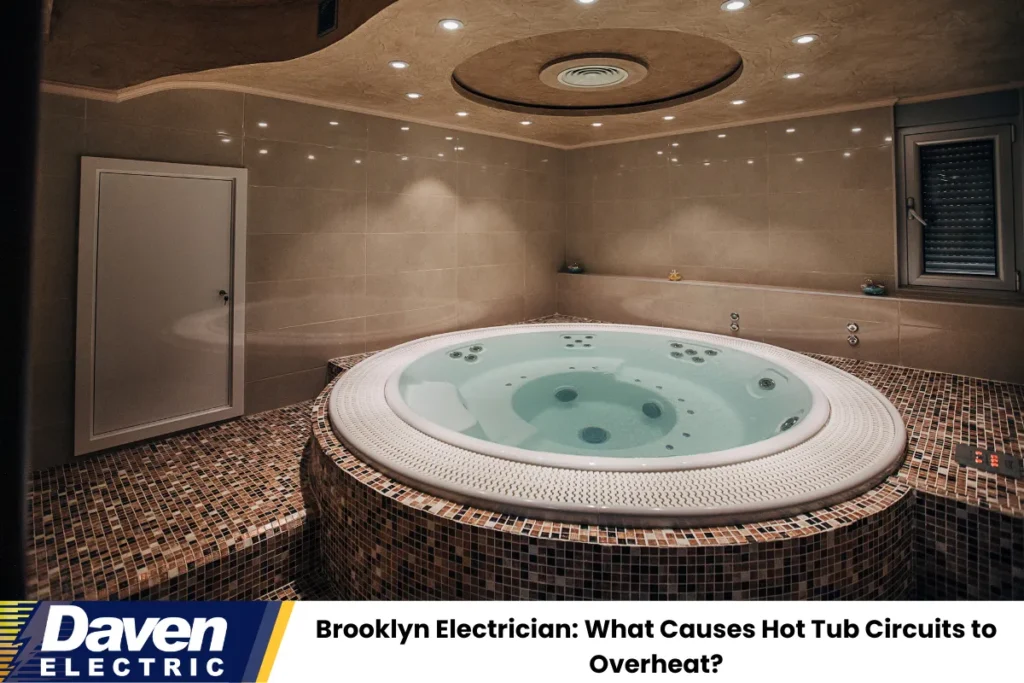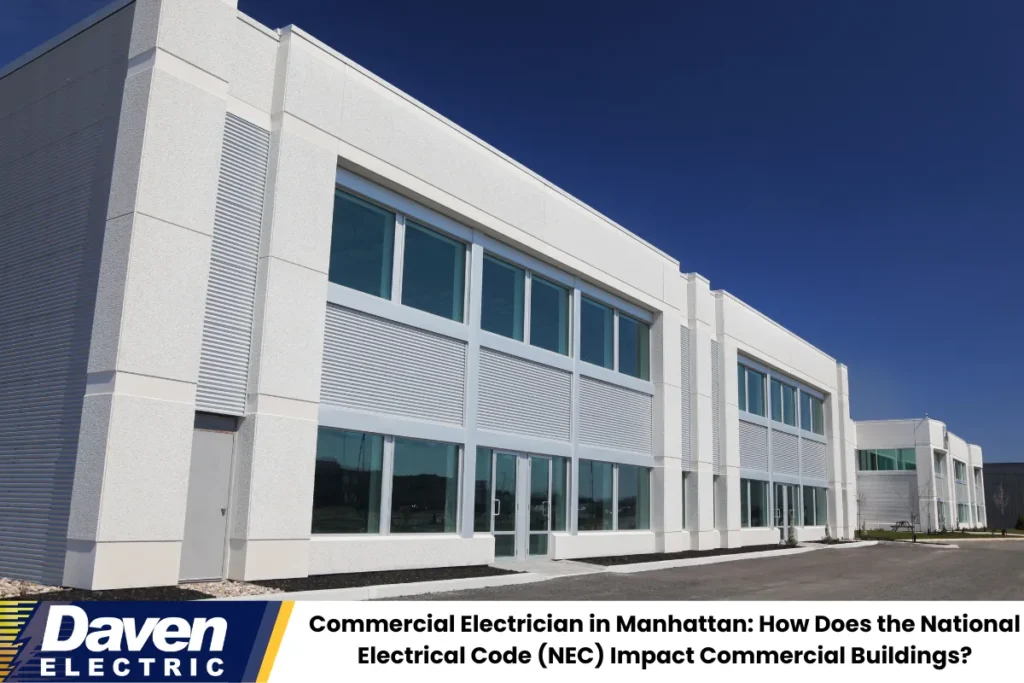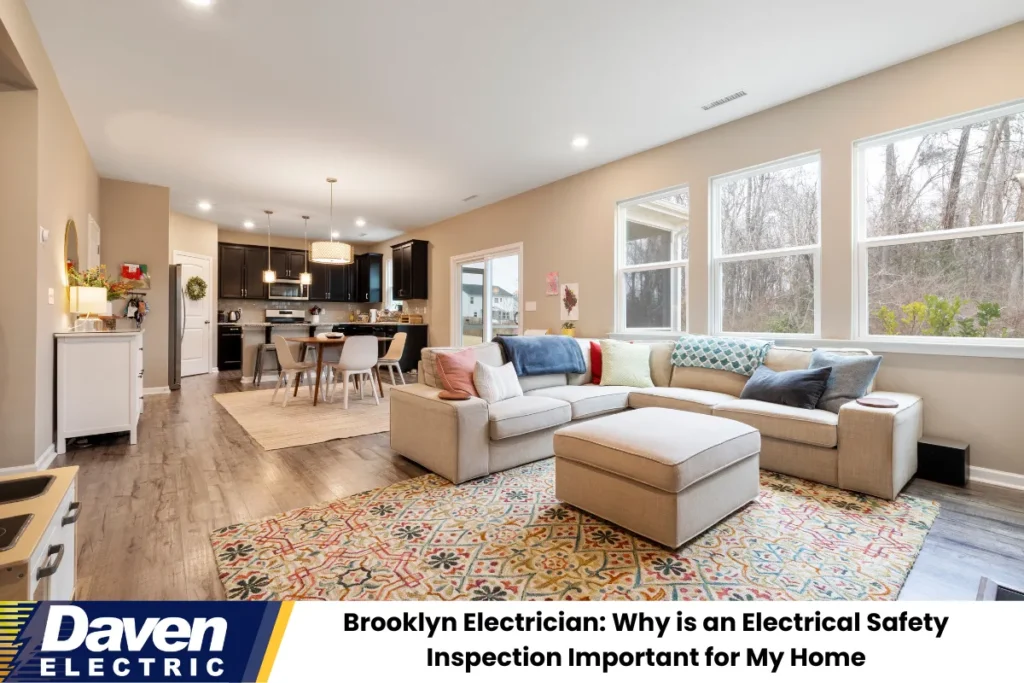Troubleshooting Overheating Circuits: Why Homeowners Need Expert Electrical Help
A Brooklyn Electrician is often called when homeowners discover their hot tub circuits are overheating, putting comfort, safety, and even property at risk. This issue is more common than you might think, and it’s rarely caused by just one simple problem. Overheating circuits can lead to power loss, expensive repairs, or, in the worst-case scenario, dangerous electrical fires.
The signs may start small—like a tripped breaker or a faint burning smell—but ignoring them can turn a relaxing soak into a stressful situation. If you’re frustrated by constant hot tub electrical problems, it’s time for a solution that keeps your family safe and your hot tub running perfectly.
Relying on a licensed electrician or electrical contractor for expert electrical services ensures your system is inspected, repaired, and maintained according to strict safety standards. In this guide, you’ll learn exactly what causes hot tub circuits to overheat, what warning signs to watch for, and how the right professional can make all the difference.
Common Causes of Hot Tub Circuit Overheating in Brooklyn Homes
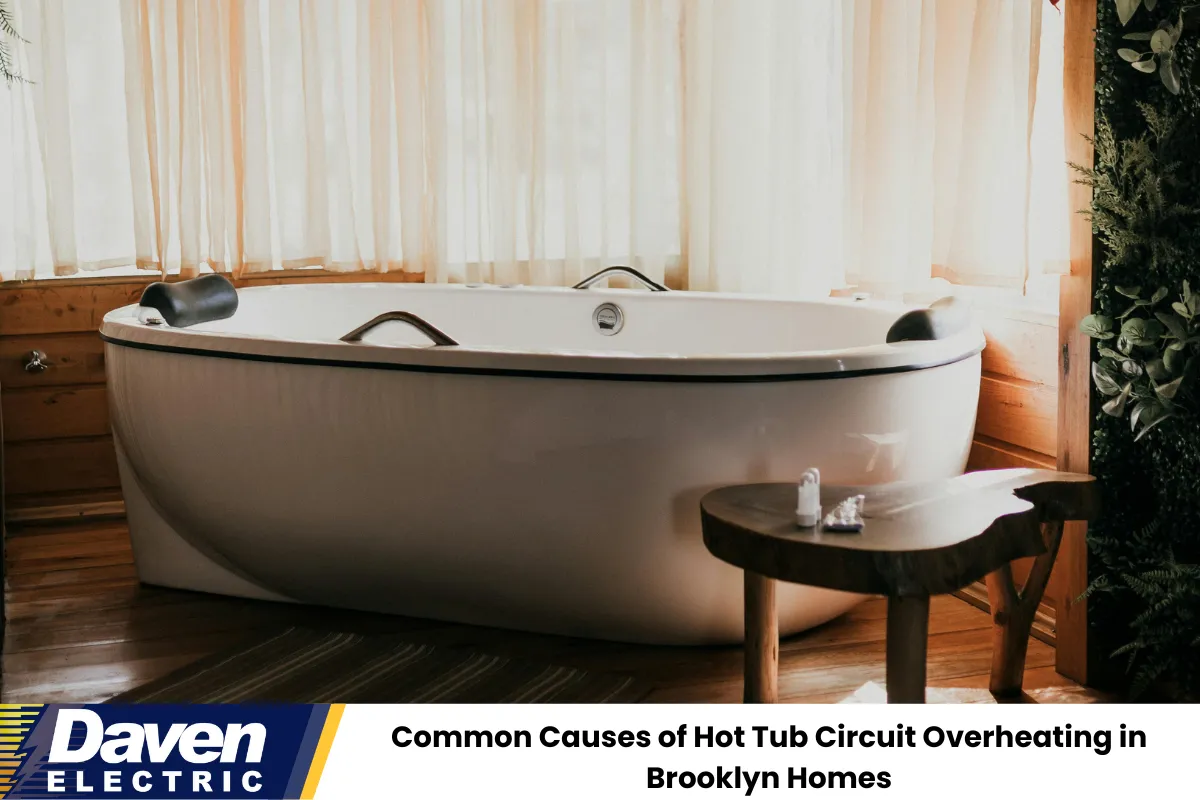
Loose Electrical Connections
One of the leading causes of hot tub circuit overheating is loose electrical connections. Over time, the vibrations from your hot tub’s pump and jets, combined with regular thermal expansion and contraction, can loosen wire terminals and connections. When electrical current meets resistance at a loose connection, it generates excessive heat, which may cause insulation to melt, wires to burn, and circuit breakers to trip.
Signs of Loose Connections
- Intermittent power to the hot tub
- Visible scorch marks on the panel
- Flickering lights or sudden power surges
- Warm or hot areas on the breaker or wires
If you notice any of these warning signs, a qualified electrical contractor should inspect your system immediately. Attempting a DIY fix is never recommended, as incorrect repairs can increase the risk of electrical fires.
Overloaded Circuits and Inadequate Wiring
Another frequent issue is overloading the circuit. Hot tubs require dedicated circuits with the proper amperage to operate safely. Using an undersized wire or connecting multiple high-draw appliances to the same line can overwhelm your system, causing the circuit to overheat.
Why Proper Wiring Matters
- Prevents voltage drops that damage equipment
- Ensures efficient operation of all hot tub features
- Complies with National Electrical Code (NEC) standards
- Reduces long-term repair costs
Experienced electricians evaluate your home’s wiring and panel capacity before installation or repair, ensuring your hot tub receives the electrical services it needs to function safely.
Environmental Factors: Weather, Moisture, and Corrosion
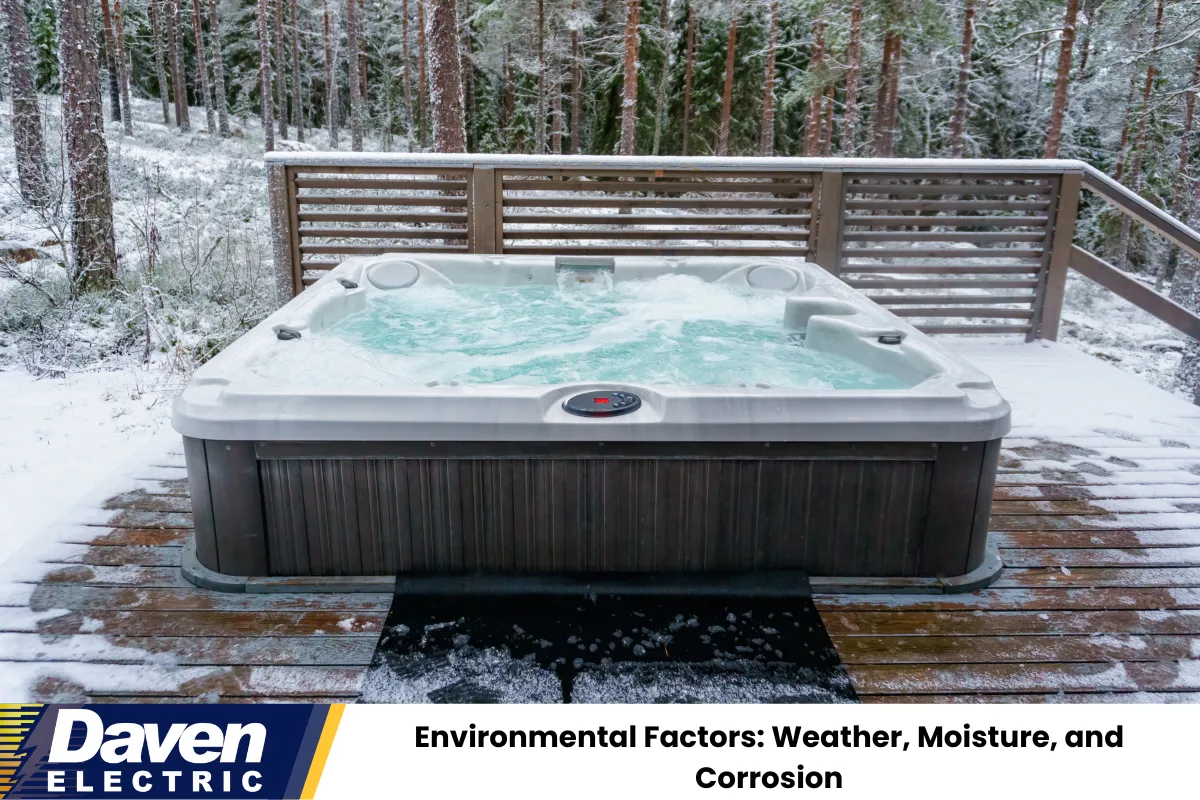
How Brooklyn’s Climate Impacts Electrical Components
Living in Brooklyn means dealing with humidity, seasonal storms, and freezing winter temperatures. Moisture intrusion is a significant cause of corrosion inside electrical panels and junction boxes near your hot tub. Corroded contacts and terminals increase resistance, which generates heat and can cause dangerous shorts or arcing.
Protecting Your Hot Tub from the Elements
- Install weatherproof covers on all outdoor outlets
- Use GFCI (Ground Fault Circuit Interrupter) protection
- Routinely check for rust or greenish-blue buildup on terminals
- Schedule regular maintenance with a licensed electrician
Failing to address moisture and corrosion can quickly escalate from a minor annoyance to a major electrical hazard.
Faulty Components and Manufacturing Defects
The Hidden Dangers of Substandard Parts
Even when installation is correct, overheating can still occur if your hot tub or its electrical components are defective or of poor quality. Low-grade circuit breakers, undersized fuses, or generic replacement parts may not meet the required safety ratings for your specific model.
Risks of Using Poor-Quality Parts
- Inconsistent electrical flow
- Premature failure of relays, pumps, and heaters
- Voided manufacturer warranties
- Increased likelihood of system-wide electrical issues
Hiring a certified electrical contractor for your hot tub electrical services ensures only genuine, manufacturer-approved parts are used during repairs or upgrades.
Poor Installation Practices: The Case for Professional Electrical Services
Why DIY Hot Tub Wiring is Risky
Many Brooklyn homeowners are tempted to save money with DIY installations or unlicensed handyman work. However, improper wiring, skipping permits, or failing to bond and ground equipment correctly creates long-term risks.
Common Installation Mistakes
- Failing to use a dedicated circuit
- Incorrect breaker size
- Improper wire gauge selection
- Lack of GFCI protection
- Not following local and national codes
Professional electricians guarantee installations are code-compliant, inspected, and tested for safety, which protects your family and investment.
Read Brooklyn Electrician: Can an Electrician Upgrade My Panel to Support New Appliances
Warning Signs Your Hot Tub Circuit Is Overheating
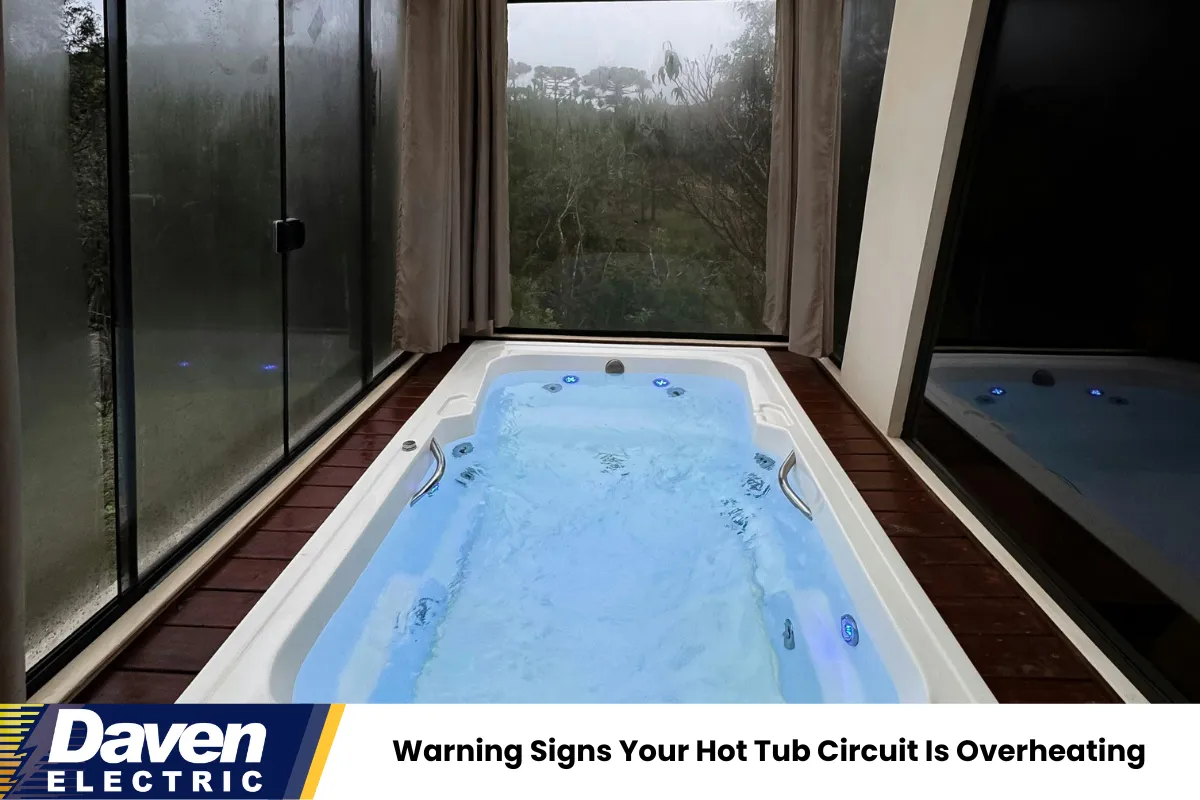
Symptoms Homeowners Should Never Ignore
Being proactive can prevent a small electrical issue from becoming a costly emergency. Watch for these signs of overheating circuits:
- Breakers that trip repeatedly
- Smell of burning plastic or rubber
- Hot or discolored outlets and switches
- Sizzling, buzzing, or crackling noises
- Water temperature fluctuates unexpectedly
- Hot tub display panel flashes error codes
At the first sign of trouble, immediately power down your hot tub and contact a qualified electrical contractor. Continued use of an overheating system can lead to equipment damage or injury.
Essential Steps for Preventing Hot Tub Electrical Hazards
Professional Installation and Routine Maintenance
Investing in professional electrical services is the most effective way to prevent hot tub circuit overheating. Here’s what a licensed electrician can do:
1. Evaluate Electrical Load
Before installation, your electrician will calculate your home’s electrical capacity and ensure the hot tub receives a dedicated circuit, preventing overload.
2. Use Proper Wiring and Components
Only the correct wire gauge and high-quality, weather-rated parts will be used to ensure safe and reliable performance.
3. Secure All Connections
All wire terminals, bus bars, and ground points are double-checked and tightened to manufacturer specifications.
4. Apply GFCI Protection
All outdoor and wet-location circuits must include GFCI protection to minimize the risk of shock or fire.
5. Schedule Preventive Inspections
Annual checkups allow your electrician to spot and fix minor issues before they become dangerous.
Hot Tub Circuit Safety Upgrades Brooklyn Homeowners Should Consider
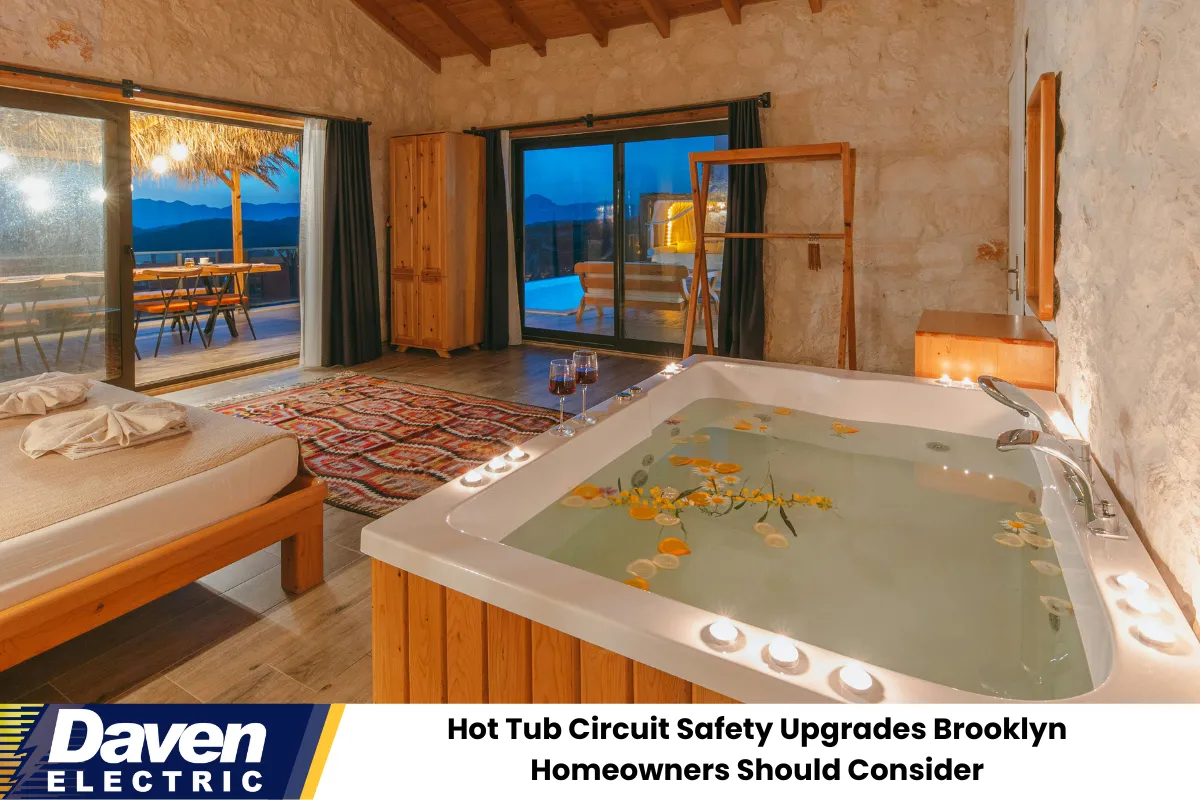
Making Your Backyard Spa Safer and More Reliable
If your hot tub is more than a few years old, upgrading its electrical system can add years of safe, trouble-free use. Some smart upgrades include:
- Upgrading to AFCI breakers: These advanced breakers detect dangerous arcs that standard breakers miss.
- Replacing weather-exposed wiring: Old or cracked insulation should be swapped for new, water-resistant cables.
- Adding outdoor-rated junction boxes: Protects connections from rain, snow, and pests.
- Installing surge protectors: Shields sensitive electronics from power spikes caused by storms or grid issues.
These upgrades are best handled by an electrical contractor familiar with local codes and weather conditions.
Why Brooklyn Homeowners Trust Licensed Electricians for Hot Tub Repairs
The Benefits of Working With a Qualified Electrical Contractor
Trying to save on labor costs by skipping professional help can be a false economy when it comes to hot tubs. Here’s why experienced electricians are the best choice:
- Comprehensive safety knowledge: Trained in all local, state, and national codes.
- Access to the right tools and diagnostic equipment: Pinpoints overheating sources quickly.
- Warranty protection: Most manufacturers require professional installation for warranty coverage.
- Insurance compliance: DIY wiring or unlicensed work may void homeowner’s insurance.
Choosing professional electrical services ensures that your hot tub remains a safe and relaxing feature for years to come.
Brooklyn Electrician – Daven Electric Corp.
If your hot tub circuit is overheating, it’s time to call the experts at Daven Electric Corp. Our licensed Brooklyn electricians specialize in diagnosing and repairing electrical issues that cause overheating, tripped breakers, and wiring hazards. We provide safe, efficient, and lasting solutions to keep your system running smoothly. Whether you’re in Brooklyn, New York, or nearby areas, our team is ready to help. Don’t risk electrical damage or safety issues—trust the professionals who know how to handle it right.
📞 Call (212) 390-1106 or fill out our online contact form today to schedule your service with a reliable electrician you can count on.
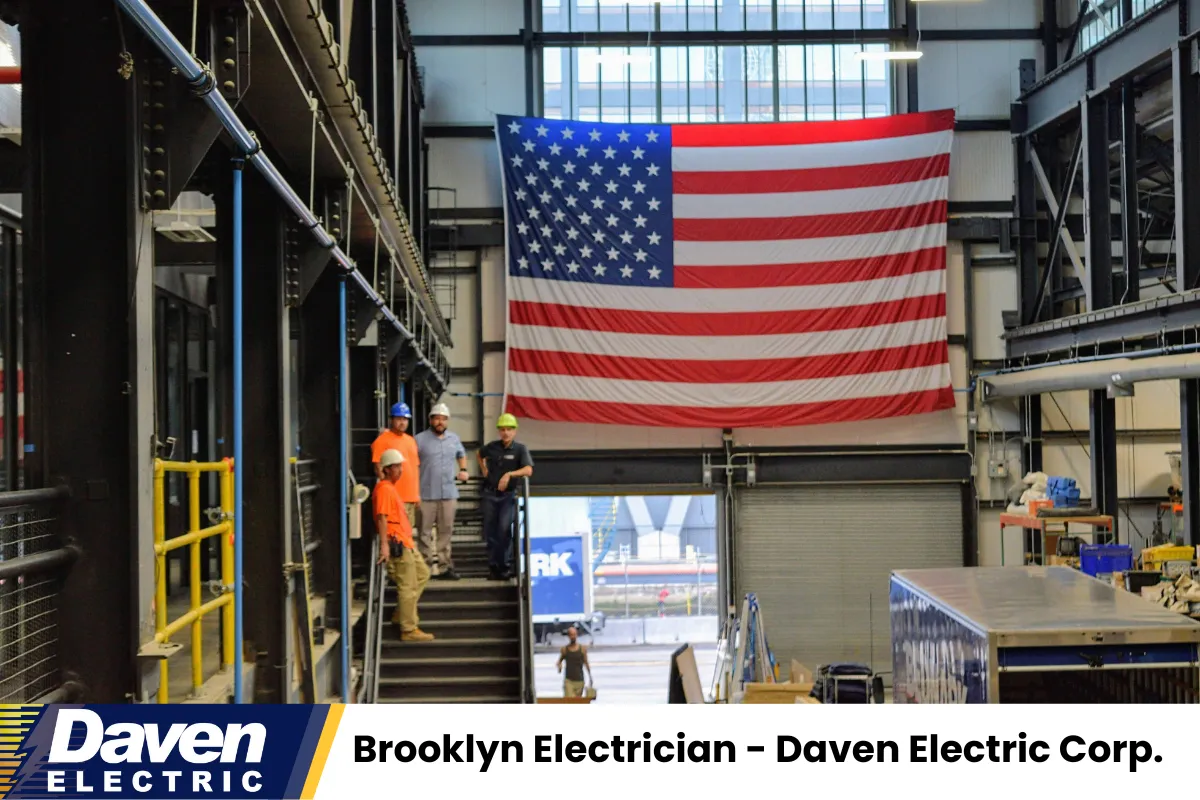
Frequently Asked Questions
1. Can I use my hot tub if the circuit breaker keeps tripping?
No, you should not use your hot tub if the circuit breaker is tripping. Frequent tripping is a sign of underlying electrical problems such as overload, short circuit, or ground fault. Using the hot tub in this condition increases the risk of fire, shock, or permanent damage to your equipment. Always call a qualified electrician to inspect the system and fix the problem before resuming use.
2. How often should my hot tub’s electrical system be inspected?
It’s recommended to have your hot tub’s electrical system professionally inspected at least once a year, and any time you notice irregularities. Seasonal changes, heavy usage, and outdoor conditions can accelerate wear on wiring and components. Routine inspections by a licensed electrical contractor ensure early detection of issues, preventing costly repairs and keeping your hot tub safe.
3. Is it possible to upgrade an old hot tub’s electrical system?
Yes, upgrading an older hot tub’s electrical system is not only possible but highly recommended, especially if your unit is over ten years old. Upgrades may include new GFCI protection, modern weatherproof wiring, or more advanced breakers. These changes increase safety, efficiency, and compliance with current electrical codes. Always have upgrades performed by an electrician experienced with hot tubs.
4. What should I do if I smell burning plastic near my hot tub?
If you detect a burning plastic smell near your hot tub, immediately turn off power to the unit at the breaker box. This odor usually indicates overheated wiring or a failing electrical component. Continuing to operate the hot tub could cause a fire or severe equipment damage. Do not attempt repairs yourself; contact a licensed electrician to diagnose and fix the issue safely.
5. Are there specific electrical codes for hot tubs in Brooklyn?
Yes, hot tubs must comply with both national and local electrical codes, which specify requirements for wiring, grounding, GFCI protection, and outdoor installation. Brooklyn and New York City have additional regulations for outdoor electrical equipment. A licensed electrical contractor will be familiar with all applicable codes, ensuring your installation is safe, legal, and up to date.

